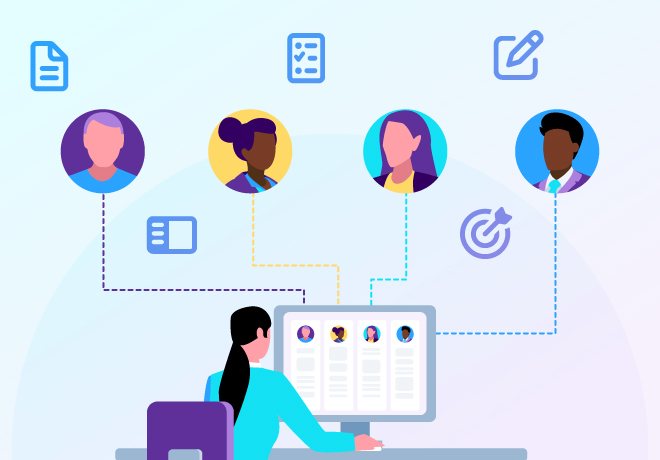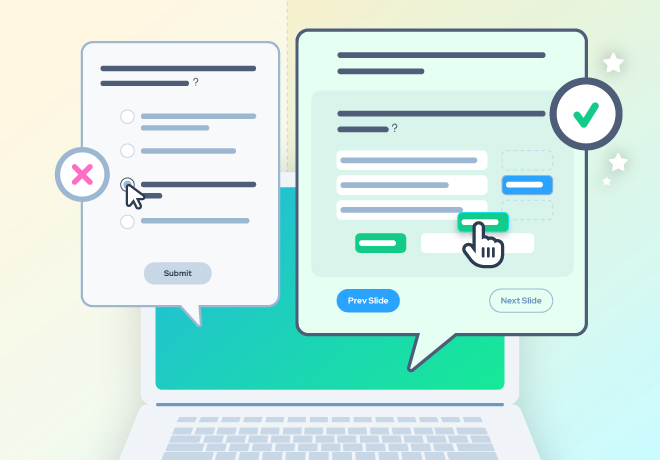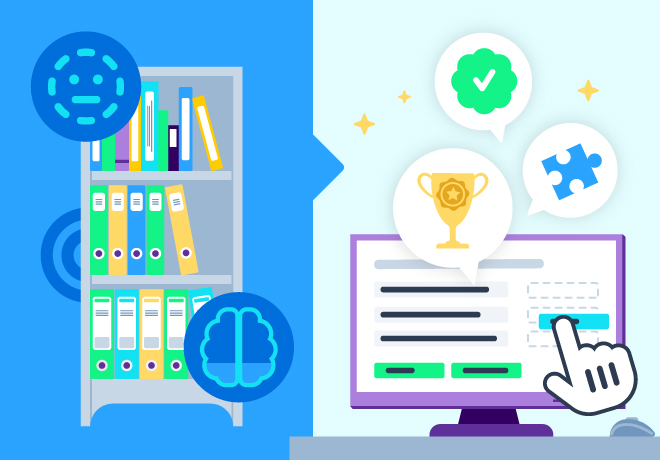
5 Tips for successfully working with subject matter experts

Related articles
Get valuable eLearning insights to your inbox.
Listen to Neovation’s Demystifying eLearning podcast generated with NotebookLM!
Listen to our podcast on your favorite platform!
Managing any eLearning project brings its own challenges. Add to that the need to influence key Subject Matter Experts (also known as SMEs) and a project can be put at risk. Everyone is busy and you need their expertise (and time) to move your agenda forward.
So, how do you effectively work with SMEs so that deadlines are met and everyone comes away from the project feeling good about the overall experience? Here are five tips to help you optimize your process while working with SMEs.
In our article, explore:
- Identifying your SMEs
- Setting a solid foundation for collaboration
- Asking the right questions
- Setting timelines
- And staying organized
With Neovation, you can turn your SME's knowledge into an accessible source of truth for your learning programs. Get a free quote to see how Neovation works with your SMEs.
Tip #1: Identify your project’s Subject Matter Experts
Request a list of the Subject Matter Experts from your main point of contact which will be needed to complete the project. Capture important information such as:
- Name
- Email address
- Job Title
- Field of expertise
- Level of involvement in the project
- Best way to communicate with them
Understanding who needs to be involved will allow you to communicate with everyone more effectively including providing them with expected timelines and milestones that will require their input. You can also reach out early in the project and determine if key people will be away during a crucial phase thus allowing you to mitigate situations early on.
Tip #2: Set a strong foundation for collaboration
Share Project & Participant Details
Set a strong foundation by sharing details about the project and its participants. Start by sending an introductory email to all SMEs letting them know who you are and what your role is in the project. You may also wish to share the list of SMEs specific to your project so everyone is aware of who is participating. Those involved will need to know who to go to when they have questions — make it easy for them to communicate and your project will go much smoother. Don’t forget to obtain permission to share this information with the group before you do so!
Set Up Regular Meetings
Start your project with a kick-off meeting or call and include key project stakeholders and Subject Matter Experts. This allows everyone to get on the same page with the overall goals and schedule for the project. A screen sharing call would be ideal for this type of meeting, using apps such as Skype or Join.Me. During this call, you can familiarize everyone with key tools for the project and get their buy-in on regular meetings. A sample agenda may look like the following:
- Introductions of project team members and their role
- Overview of project goals, milestones and deadline
- Review of relevant collaborative project management tools, like Google Drive or Dropbox, used to facilitate sharing materials and documents — here’s a list of some of the most popular collaboration tools
- Assignment of specific tasks including expected outcomes and timelines
- Discussion of next steps including ongoing project meetings or calls

Regularly scheduled meetings can go a long way to your project's success. Getting these on your team’s calendar early will allow you to monitor progress, overview milestones or deadlines, and to discuss any challenges or risks to the project as a whole. If you don’t have anything to discuss that week, just cancel and give them back time in their day!
Tip #3: Research & ask the right questions
Start with your own industry research to give you a better understanding of the project material and the overall content. Having good background knowledge also gives you the ability to offer recommendations and prevent undesired learning outcomes.
Once you’ve done your research, begin by asking the questions that are the most important to your project:
- Who is the learner audience for the eLearning? What are their particular needs such as the need to access training on mobile devices or the need to have accessibility supports?
- Do the Subject Matter Experts have details about their target audience, such as geographic, demographics, psychographics, and/or behavioral? Having a deep understanding of who your learners are will allow you to create courses that are engaging and effective.
- What are the desired learning outcomes?
- Are there any documents, assets, or other materials available and ready to use?
- Are there any specific ideas for activities or learner engagement that should be incorporated in the course?
Tip #4: Set Timelines
Setting timelines will help overcome the challenges faced with project delays. Set up a work-back schedule that includes timelines for each milestone of the project. Detailing the information in this format will allow everyone to know what they need to do, when they need to start it, and when it needs to be completed. SMEs all have busy lives and projects are often extra work for which they’ve been "volunteered". Well defined timelines set everyone up for success with clear expectations.
Tip #5: Stay Organized
Your preparedness to capture SME knowledge efficiently will result in their increased motivation to share their expertise. The quicker and easier the process is, the more likely they will be to do so. Beyond scheduling the tasks, there are other ways to demonstrate strong organization and project structure.
File Names
Keep yourself and the SMEs organized by keeping materials neatly ordered with easy and clean file names. Creating a filing name system such as yyyy-mm-dd Filename.pdf is key to successfully managing and tracking of the high number of documents and files.
Templates
Creating templates for commonly used documents allows you to stay organized and remain consistent with the type of information required for effective feedback management and collaboration. SMEs who are involved in multiple projects will appreciate the efficiency created from working with familiar documents.
Folders
Organize the project material in folders with a progressive and logical approach. Giving the SMEs structured folders that will allow them to sort and gather their knowledge efficiently.
As a project manager, one of your main goals is to ensure that you set up an environment in which every member involved in the project is successful. By following these tips you are more likely to successfully capture their shared knowledge and expertise while fostering confidence in your abilities to not only effectively manage project work internally (your team members) but also externally (your SMEs).
Learning Hub: free resources for eLearning
The Neovation Learning Hub contains many free resources and articles that can help you improve eLearning outcomes at your organization. Continue learning about Instructional Design topics, read articles on Custom eLearning Development, or find new eLearning tools to help you with your eLearning initiatives.

Jennifer is the Team Leader for Neovation's Custom Learning team with a background in sales, leadership, training and development, and a passion for helping clients achieve their training dreams.
Become part of our L&D community
We publish a new learning hub article — full of useful, practical topics — weekly.
Not sure where where you want to start? Jump into one of our recently published articles and see where it takes you!








-svg.svg)
-svg.svg)
-svg.svg)
-svg.svg)